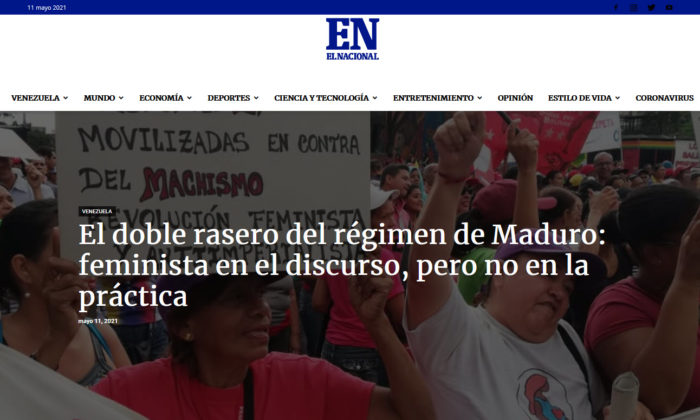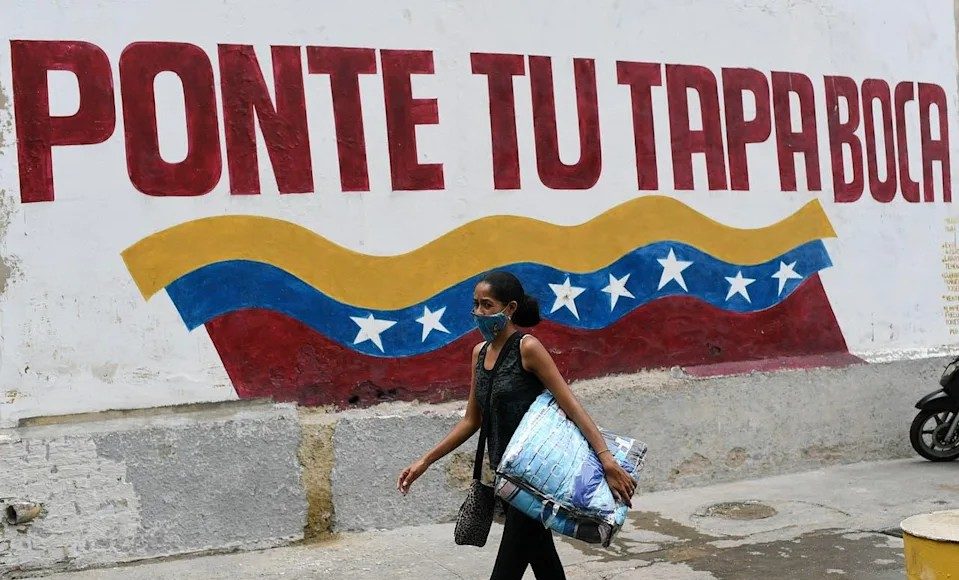The coronavirus crisis has worsened censorship in Venezuela. With its Supreme Court recently issuing a $13 million fine to the online newspaper El Nacional, there is serious concern for the future of free speech. The paper’s lawyer has said the outlet cannot afford to pay and, as the only remaining independent newspaper, there is a danger Venezuela is fighting a losing battle for press freedom.

The fine was imposed on the grounds of ‘moral damage’ to Diosdado Cabello, widely regarded as the second most important figure in the Venezuelan government. El Nacional reproduced a story from the Spanish newspaper ABC, which alleged Cabello had links to drug trafficking.
El Nacional had already been subject to government pressure in 2018, when it stopped printing and became a purely digital platform. As the government opposes online publishing, Venezuelan media is now largely dominated by government programmes and announcements, known as cadenas, which all media are obliged to transmit (other Latin American countries also use cadena nacional for official announcements, but the scale of these in Venezuela is exceptional).
There are no legal precedents for the case against El Nacional, and it looks like a device tailored by government supporters in order to attack the outlet. If a law like this has never previously been applied, how did the judges determine that such an amount be paid?
Controlling reporting of the pandemic
At the beginning of the pandemic there was an increase in arrests linked to the use of social networks and messaging services, such as WhatsApp, for issues related to Covid-19. Journalists have not been considered by the Maduro regime to be essential workers, meaning that they face arbitrary restrictions. Over the past year, people have been banned from taking photographs in or around medical institutions or other public spaces, severely restricting Venezuelan journalists’ access to information about the virus.
These violations of freedom of information in Venezuela are captured in Trochas de la Información, a short film directed by Isabela Herradas. The film is part of an educational programme by Gran Circuito Cine, which trains young people in human rights issues, multimedia, and filmmaking techniques. It shows a compilation of journalists raising their voices in defence of the right to be informed. (The film is reviewed for LAB by Emily Gregg).
Darvinson Rojas has been condemned for ‘fulfilling his duty of informing the population’. After publishing information on Covid-19, government officials charged him with instigating hate and public disturbance. The FAES (National Police Action Force) came, and when the family didn’t open the door, they broke it down, beat them and arrested them. After a few hours his parents were freed, but Rojas was kept prisoner for 12 days – simply for publishing statistics that differed from official data.
A similar case can be seen with well-known journalist Gregoria Díaz. Towards the beginning of the pandemic, Díaz saw on Twitter that a Venezuelan citizen who had recently returned from China was in hospital with COVID-19 symptoms. After sharing this information on her personal account, she began to be persecuted by authorities. In Trochas de la Información she affirms that ‘freedom of expression, opinion, and information isn’t just a journalist’s right, but the right of a citizen.’
Activist Carlos Correa has also faced threats for reporting. He says that if he himself is informed, it is his ‘responsibility as a Venezuelan citizen’ to inform others. He affirms the best way to defend this right is to practice it: ‘one of the things we have to do as a society is look for quality information and overcome all of the barriers to access.’ While Correa affirms the main way to stay informed in Venezuela is on the web, cases violating free speech are growing each day. According to the annual report by Venezuela’s Press and Society Institute (IPYS), in 2020 there were 374 reports totalling 636 violations to freedom of speech and information – both in print and online.
Luisa Maracara, a journalist from Crónica Uno remarks, ‘it’s very unlikely that an independent journalist who works for independent media can get answers to their questions and concerns while reporting or investigating. Official sources, ministers, mayors, or leaders in a high position, like the president and vice president, won’t give interviews. They don’t respond to questions.’
It is this complicated relationship between government and media that has led many to see Venezuela’s official COVID figures as implausible, indicating a strategy of concealment. As of 4 May, Venezuela’s official total of confirmed cases was only around 200,000; meanwhile the cases in neighbouring Colombia have reached just shy of three million. Venezuela’s government has no answers to its coronavirus problems, so instead it tries to control the narrative, more and more of which is being written online.
The Venezuelan Constitution establishes that ‘everyone has the right to timely, truthful and impartial information, without censorship’. This implies it is the duty of the State to guarantee the right to access sources of information, seek and disseminate news regarding matters of public interest. Yet the punitive moves against El Nacional directly threaten that right, and by targeting an independent news source, however critical, lend credence to charges that the Maduro government is an enemy of the free press.
The cases of journalists like Rojas, Díaz, and Correa show laws are increasingly being misused to intimidate and imprison those who resist. Trochas de la Información emphasises that freedom of speech is needed for the ‘development of a dignified life’ in Venezuela. When it is lost, ‘we lose what it means to be human’.
LAB adds: The charges of drug-trafficking against Diosdado Cabello are hotly disputed and it is certainly the case that the US government has expended much effort on allegations that the Maduro government and its senior officials are directly involved in narcotráfico. El Nacional may be somewhat disingenuous in its claim to be merely reproducing a story.
Main image: ‘Wear your facemask’

